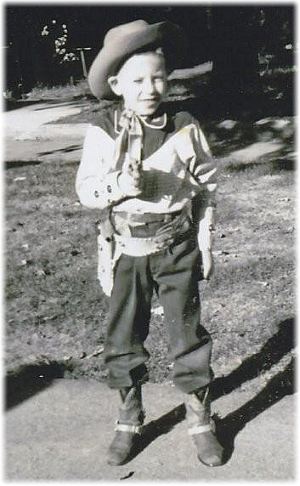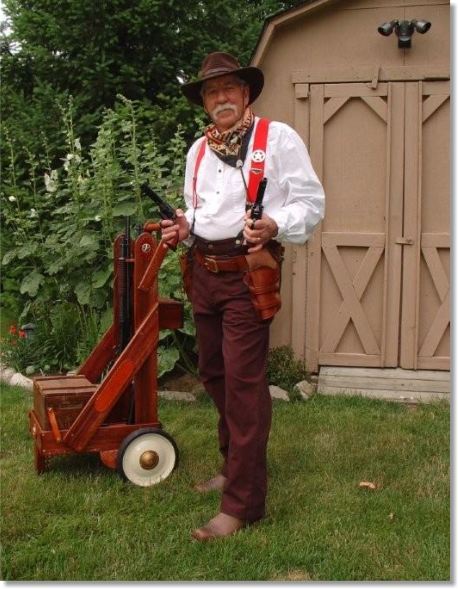 |
 |
 |
 |


"My cowboy days started in
1945
when my Grandma Janes gave me
my first gun and holster
set..."
By Tom
Janes |
 |
 |

COWBOY TOM |
 |
 |
 My cowboy days started in 1945 when my Grandma
Janes gave me my first gun and holster set. A white leather single holster
fitted with a Hubley Texan Jr. pistol and wrist cuffs to match the holster.
Both holster and cuffs were decorated with chrome studs and red glass jewels.
On Christmas morning the thrill of receiving such a wonderful gift from my
grandmother was so great that the color of the leather didn't bother me a bit.
If the good guys wore white hats, why not a white gun belt? It wasn't until we
moved from Rockford, Illinois to Indianapolis, and I met the other cowboys and
cowgirls in the neighborhood that I discovered that the only other white set
being worn was by the cute cowgirl two doors down the street. It took a few
strong words and the threat of a folded five in the nose to convince my new
friends that a tuff cowboy could wear a white holster set. My cowboy days started in 1945 when my Grandma
Janes gave me my first gun and holster set. A white leather single holster
fitted with a Hubley Texan Jr. pistol and wrist cuffs to match the holster.
Both holster and cuffs were decorated with chrome studs and red glass jewels.
On Christmas morning the thrill of receiving such a wonderful gift from my
grandmother was so great that the color of the leather didn't bother me a bit.
If the good guys wore white hats, why not a white gun belt? It wasn't until we
moved from Rockford, Illinois to Indianapolis, and I met the other cowboys and
cowgirls in the neighborhood that I discovered that the only other white set
being worn was by the cute cowgirl two doors down the street. It took a few
strong words and the threat of a folded five in the nose to convince my new
friends that a tuff cowboy could wear a white holster set.

 As anyone who ever
played cowboys knows there were certain things that had to be understood prior
to starting. The one universal rule was when you were shot you had to count to
ten slowly and then you were a new man. For those that couldn't count, well
they just laid there for awhile. Being shot was a huge part of the fun. It was
then that you could demonstrate your best act of dying. An argument usually
ensued as to who was the best. The other thing that had to be clarified was a
description of the imaginary horse you were riding as well as the saddle. Mine
in most cases was a golden Palomino with a long flowing tail and mane and
fitted with a black saddle and bridle that was adorned with silver studs and
dripping stirrups. Of course your horse was high spirited and as you described
him you were dancing in place, kicking up as much dust as you could while you
reined in your mount. The younger boys that couldn't come up with a description
on their own were helped with a brief account by the big guys of seven and
eight. A brown nag with a brown saddle and, of course, their horses were slow.
This usually led to an uproar of laughter by those of us riding the
stallions. As anyone who ever
played cowboys knows there were certain things that had to be understood prior
to starting. The one universal rule was when you were shot you had to count to
ten slowly and then you were a new man. For those that couldn't count, well
they just laid there for awhile. Being shot was a huge part of the fun. It was
then that you could demonstrate your best act of dying. An argument usually
ensued as to who was the best. The other thing that had to be clarified was a
description of the imaginary horse you were riding as well as the saddle. Mine
in most cases was a golden Palomino with a long flowing tail and mane and
fitted with a black saddle and bridle that was adorned with silver studs and
dripping stirrups. Of course your horse was high spirited and as you described
him you were dancing in place, kicking up as much dust as you could while you
reined in your mount. The younger boys that couldn't come up with a description
on their own were helped with a brief account by the big guys of seven and
eight. A brown nag with a brown saddle and, of course, their horses were slow.
This usually led to an uproar of laughter by those of us riding the
stallions.

 Our house backed up to Fall Creek and a steep hill dropped from the
backyard to about an acre of land before you got to the creek. This area was
referred to as The Valley. With tree-lined dusty trails running along
the creek, it was the perfect place for an ambush or robbing the stagecoach.
The stagecoach was a Radio Flyer wagon with a wooden box tied on with a rope.
The strongbox was an old lunch box filled with rocks. Our house backed up to Fall Creek and a steep hill dropped from the
backyard to about an acre of land before you got to the creek. This area was
referred to as The Valley. With tree-lined dusty trails running along
the creek, it was the perfect place for an ambush or robbing the stagecoach.
The stagecoach was a Radio Flyer wagon with a wooden box tied on with a rope.
The strongbox was an old lunch box filled with rocks.

 Going to town was a
hard ride through The Valley and up the hill, through the backyard and
across the street to the alley. The garages in the alley were our western town.
Most of the garages were only three or four feet apart. With trees and their
branches in close proximity to the garage roofs, we could shimmy up the trees
and out on the branches to the garage rooftops. Once there we could go from one
rooftop to another during our gun fights. This lasted until we were discovered
by a garage owner and were forced to gallop back to The Valley with guns
blazing and hooting and hollering. Going to town was a
hard ride through The Valley and up the hill, through the backyard and
across the street to the alley. The garages in the alley were our western town.
Most of the garages were only three or four feet apart. With trees and their
branches in close proximity to the garage roofs, we could shimmy up the trees
and out on the branches to the garage rooftops. Once there we could go from one
rooftop to another during our gun fights. This lasted until we were discovered
by a garage owner and were forced to gallop back to The Valley with guns
blazing and hooting and hollering.

 Saturdays were special, because the Zaring Egyptian Theater, two
blocks away, had the Saturday matinee which was usually a western. We would
saddle up and gallop down the dusty trail and across the bridge on Collage
Avenue to Fall Creek Boulevard and then West on the other side of the creek
along the trails of the park to Central Avenue where the Zaring was located. It
was mandatory to check your guns at the cloakroom where you were given a brass
coin with a hole in it. To lose this coin would mean losing your gun holster
set forever. After a thrilling western adventure and popcorn, we'd pick up our
hardware at the cloakroom, and it was back down the trail reenacting the
adventure we had just seen. Saturdays were special, because the Zaring Egyptian Theater, two
blocks away, had the Saturday matinee which was usually a western. We would
saddle up and gallop down the dusty trail and across the bridge on Collage
Avenue to Fall Creek Boulevard and then West on the other side of the creek
along the trails of the park to Central Avenue where the Zaring was located. It
was mandatory to check your guns at the cloakroom where you were given a brass
coin with a hole in it. To lose this coin would mean losing your gun holster
set forever. After a thrilling western adventure and popcorn, we'd pick up our
hardware at the cloakroom, and it was back down the trail reenacting the
adventure we had just seen.

 Willie Nelson said in song, "All of my heroes were
cowboys..." and it was true for me as well. Tom Mix, Buzz Barton, Roy Rogers,
Gene Autry—all lived by the cowboy code and we kids tried to live by that
code too, at least when it was convenient or we were reminded by our
parents. Willie Nelson said in song, "All of my heroes were
cowboys..." and it was true for me as well. Tom Mix, Buzz Barton, Roy Rogers,
Gene Autry—all lived by the cowboy code and we kids tried to live by that
code too, at least when it was convenient or we were reminded by our
parents.

 I never outgrew my love for the life of a cowboy or having cap guns
which I still collect today. I never outgrew my love for the life of a cowboy or having cap guns
which I still collect today.

 — Tom Janes — Tom Janes


STILL A COWBOY!
 |
 |
|
 |
This Web Site © Copyright All Rights Reserved
|
 |
 |
 |

|
|